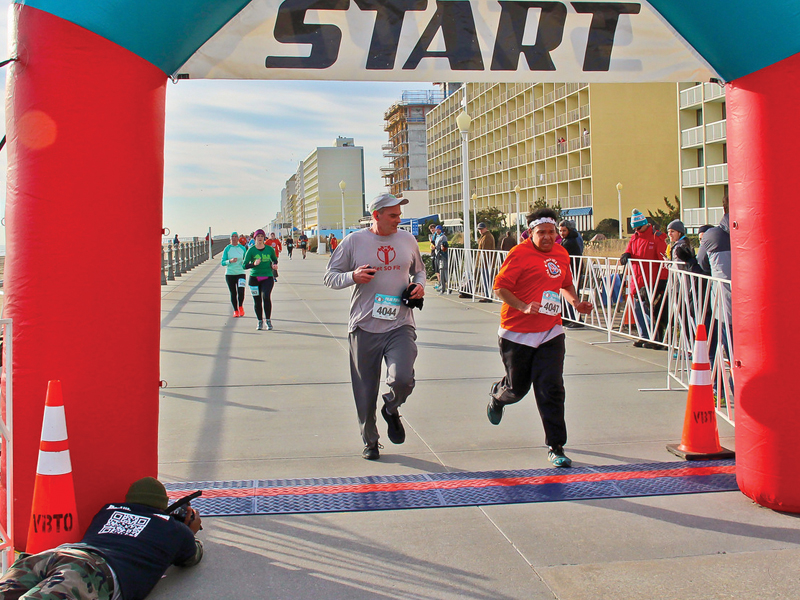Every season that Wade Crawford, his wife and three children have helped coach Special Olympics athletes has brought incredible highlights.
There are athletes who never imagined they could finish a 5K run, but then train for months and do. Some have started daily home workouts to take control of their health. One grew so strong that her doctor cancelled an upcoming heart surgery. One was able to stop growth hormone therapy; another is no longer diabetic after dropping 60 pounds.
“There are dozens of other smaller success stories, where athletes are seeing significant weight loss, successfully completing racing events and making school sports teams,” Crawford says. The goal, he adds, is to “create a culture of fitness” to include as many children and adults with intellectual disabilities as possible.
Crawford, 46, has coached multiple sports since 2008 and is Head Coach for Get SO Fit—a yearlong exercise and nutrition training program—for Special Olympics Virginia Area 2 in Hampton Roads. His wife, Diane, and children Halley, 22, Zachary, 19, and Jesse, 13, also volunteer as head or assistant coaches, averaging four to ten hours a week outside of full-time jobs or school.
A network technician from Chesapeake, Virginia, Crawford ran high school track and competed in decathlons but says Special Olympics programs have taught him much more about sports – and life. He only wishes more people would coach.
“A large misconception is that Special Olympics is an ‘Event’ like the Olympic Games, held at certain times,” Crawford says. “It is a yearlong sports program with hundreds of athletes who meet most every week for practices and competitions. We need a lot of volunteer support to make this possible.”
How many different programs does your Special Olympics region offer?
Seasonally, Area 2 offers basketball, volleyball, bowling, softball, roller-skating, speed skating, figure skating, swimming, soccer, golf, track and field, bocce, paddle boarding, tennis and year-round fitness training with Get SO Fit.
Why did you become a coach?
My wife coached Special Olympics roller-skating in New York before we were married. After moving to Virginia, she sought out the (local) organization and started a roller-skating program. She brought me and our kids out to a basketball practice and we were hooked.
What do you think would surprise people about Special Olympics athletes?
Our athletes truly play for the joy of the game. They love to compete and improve, and they love their fellow athletes. If you want to see what sports are really supposed to be about, come watch a Special Olympics competition. You will see athletes trying their hardest to win, but always with love and respect for their fellow competitors. The crowd cheers on every player and everyone leaves knowing their efforts were appreciated. Most of all, Special Olympics sports are a ton of fun to coach, volunteer for, participate in and watch. Many people see us as a charity organization, but this is a sports organization where practice, competition and sportsmanship are held in high regard.
Who is eligible to become an athlete, or a coach?
Anyone 8 or older who has an intellectual disability can become a Special Olympics athlete; there is a Young Athletes program for kids ages 2 to 7. To get involved as a coach, just find Special Olympics near you and contact your local leadership.
What have you found is the best approach as a coach?
I focus on small improvements every week of practice. Those are a source of pride for me and my players, and they add up to better players, better teams and stronger sports programs overall.
What is the goal of Get SO Fit?
Special Olympics has put a massive amount of effort into successfully creating sports programs that mirror Olympic programs. In my opinion, where we fall short is in the culture of fitness. If our athletes want to get healthier, they need more than one or two sports practices in a 10-week season. Exercise and training are hard for everybody and that’s really the point. I tell my athletes that if they compete with Special Olympics, then they are athletes, and athletes have a responsibility to themselves, their teammates and their sports to be as strong, fast and flexible as they can be. Our mantra is, “It doesn’t matter what anyone else can do. Work On You!” Our workouts are designed for athletes of all abilities.
I want our athletes to have the basic exercise knowledge to feel comfortable working out anywhere within our organization or outside of Special Olympics.
What kind of difference do the programs make?
We offer what all sports programs offer: opportunities for fun, competition, community, purpose and accomplishment. Within Get SO Fit, we’ve had success in making exercise, fitness and healthy food choices part of our local Special Olympics culture.
What do you love most about being a coach?
The athletes have become part of my family and I look forward to seeing them every week. I also can’t think of a better way to have taught our children about perspective and respect for others. Our children, who have volunteered for as long as I have and who are now coaches themselves, have said Special Olympics will always be part of their lives.
What is the biggest challenge?
Getting enough volunteers on a consistent basis. The more volunteers we have, the more individual attention we can provide to our athletes.

